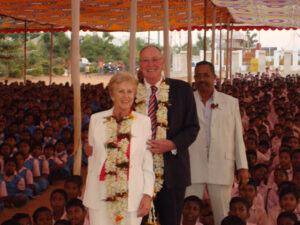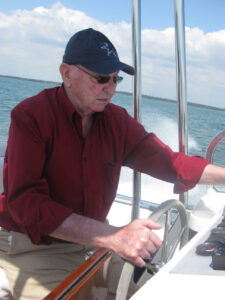We lost a friend on 9 October 2021. While the news of Martin Hunter’s death filled us with grief, our memories of Martin are quite the opposite. It seems right to share them with you on the Kluwer Arbitration Blog, which he supported from its creation.
We are the “M”s – Martin’s research assistants, whom he numbered from M II to M XXVIII. The legend goes that this numbering was born of Martin’s first two research assistants sharing his first name. After much confusion, to identify which Martin was who, Martin decided to call himself M I, the first research assistant M II, and the next M III. By the time his third research assistant turned out to be named Roman rather than Martin, the tradition had been set, and Roman became M IV. The practice lasted through his 27 successive research assistants.
Readers of the various texts written in recent days about Martin will have noticed that the word “friend” appears and reappears frequently. One of his most profound contributions to the (legal) world is a sentence we have heard him say many times when speaking about lawyers, barbers, hotel bartenders, and pretty much everyone who crossed his path:
“Yeah, I know them: a good friend!”
In fact, he was so prolific with the term “friend” that, at first, more than one of us thought he was being facetious. Turns out he was not – far from it! While intellectually brilliant and equipped with clarity of legal mind that kept stunning his peers and students, he radiated a warmth, joviality, and a joie de vivre that made him bridge cultural and social divides and win even more hearts than his mind had already conquered.
Whenever there will now be talk of his legacy, we feel it is our duty to Martin to continue paying forward the gift that he gave to us across continents and cultures: friendship and generosity towards younger lawyers and peers with mentorship and guidance.
Martin’s approach was the same wherever he went. He wanted to “leave things better than you find them”. Some 14 years ago, at the Vis Moot in Vienna, Martin said: “My dream is that one day, when there is yet another conflict between two countries, the legal representatives sent to negotiate will recognise each other from the Vis Moot they did decades ago, where they faced the same problem and forged friendships. This, I think, will allow them to resolve that conflict.” Today, this message rings truer than ever.
Martin had a knack for profoundly influencing the many people who crossed his path, be it at Freshfields, Essex Court, KCL, KIIT, the Vis Moot, through his book, or at a barber shop near the Lemon Tree pub where he held his “Friday Clinics”. Jovially, Martin always enjoyed suggesting a new hairstyle.
His mentorship and guidance went beyond international arbitration. Once, after a class at King’s College, just outside the Strand building, he stopped by an elderly man who looked like a rough sleeper feeling sick, ignored by all students and passers-by. Martin helped him up and made sure the man was well before letting him go. The M present then, who was ready to walk past the man, had just learned the most valuable lesson of that school year.
More lightly, one of his friends recalled that “Martin once wrote on a photocopy of his book Redfern & Hunter, made for a class with him because I could not afford to buy it: ‘Dues are to be paid in beer at Essex Court Chambers!’ However, he later changed it to say that the dues were due in Gin&Tonics!”. Martin, from then on, insisted that there always be an affordable version “student edition” of his book, with identical substantive content.
Martin loved being surrounded by young minds. They inspired him, and he never felt threatened by them. Always empathetic and taking personal interest in the lives of people around him, his humane spirit indelibly impacted all who knew him, most of all, his “M”s.

He and his wife Linda (and their cats, whom Martin adored) would always keep the doors of their home open to us. We cannot count the numerous days and nights we spent at their house in Walton-on-Thames. His study, the walls filled floor to ceiling with books and journals on international dispute resolution, witnessed hard work as well as many joyful moments (always a glass of G&T in our hands). Fond of technological developments, he would often purchase the latest technical marvels at airports, and not only excitedly share his latest acquisition when we visited him at Walton, but also give away the previous iteration to a student or a friend.
Martin once told us that he had made it his personal project to support aspiring arbitration enthusiasts from the BRICS countries. In particular, his activity in the past two decades evidences his love for India and Brazil. He was a devoted supporter of KIIT University and of the University of Sao Paulo, as well as of various other universities in both countries; many of the Ms are Indian or Brazilian nationals. His generosity and zeal gave his younger friends wings to fly and the self-belief to succeed.
Of course, the world knows Martin as one of the founders of modern international arbitration, which he helped develop through sheer intellectual brilliance and remarkable contributions, such as the book Redfern & Hunter on International Arbitration. Make no mistake – Martin would often repeat that it is important to distinguish arbitration and “international” arbitration.

Such conversations were often held on the back of one of his various boats — Martin had “always” owned a boat, the latest one called Chamois. Together with Joe, one of Martin’s best friends from his neighbourhood, we would drive down to Lymington harbour, set sail (or turn on the engines) and discuss a case, draft a new section for Redfern & Hunter, comment on the latest developments in international dispute resolution, or prepare a class for one of the many university modules he taught.
His favourite teaching style was skills-based teaching. He deemed practical skills more important than niche theoretical knowledge. Using the Kaspenistan or Abukarabia case study (which he had drafted with an M in his car on the way to Lymington), he would teach thousands of students from all over the world how arbitration proceedings materialise in real life, how to properly cross-examine a witness, or how to plead convincingly.
Oral advocacy was important to Martin – he was a regular at the Vis Moot in Vienna, the most important date in his calendar. He would stay at the Vienna Marriott Hotel or the Hilton Plaza for people to be able to visit after the mooting sessions and have lunch, G&T or dinner with him. For us, the highlight of that week was the “supper” (the word mattered to Martin) he hosted every first Saturday of the Vis Moot week at Plachutta Wollzeile, an occasion to which he would invite the “M”s (and “honorary ‘M’s”) to share Tafelspitz accompanied by much Grüner Veltliner. Typical of Martin, his parting gift to us is a supper to be held there in his honour.
Martin wanted to create a legacy that would outlast him. He believed in impacting the lives of people, who would in turn impact people around them. As we look back to the memories that Martin gifted us, there is no doubt that he succeeded. He leaves behind an ever-expanding bond of camaraderie between all those who crossed his path. If you are reading this, chances are you are one of them.
In memory of M I, the Ms are:
M II – Martin Lau, London
M III – Martin Eimer, Munich
M IV – Roman Brnčal, Olomouc
M V – Tomislav Nagy, Zagreb
M VI – Alexander Lütgendorf, Dubai
M VII – Guy Conde e Silva, Lisbon
M VIII – Anne Hoffmann, Sydney
M IX – Florian Cahn, Nuremberg
M X – Alexis Martinez, London
M XI – Yves Wolters, London
M XII – Edin Karakas, Zagreb
M XIII – Alexandre Vagenheim, Paris
M XIV – Sameer Chaudhary, New Delhi
M XV – Sonal Kumar Singh, New Delhi
M XVI – Katia Finkel, London
M XVII – Gregory Travaini, Paris
M XVIII – Ziva Filipic, Paris
M XIX – Javier Garcia Olmedo, Luxembourg/London
M XX – Platon Guryanov, Moscow
M XXI – Ranamit Banerjee, London
M XXII – Alipak Banerjee, New Delhi
M XXIII – Valério Salgado, São Paulo
M XXIV – Abinash Barik, Bhubaneswar/Kuala Lumpur
M XXV – Vítor Castro, Porto Alegre/London
M XXVI – Renan Frediani Torres Peres, Sao Paulo
M XXVII – Adriano Stagni, London
M XXVIII – Simon Weber, London/Zurich
This post was co-authored by Martin Lau, Martin Eimer, Tomislav Nagy, Alexander Lütgendorf, Guy Conde e Silva, Florian Cahn, Alexis Martinez, Edin Karakas, Alexandre Vagenheim, Sameer Chaudhary, Sonal Kumar Singh, Katia Finkel, Gregory Travaini, Ziva Filipic, Javier Garcia Olmedo, Platon Guryanov, Ranamit Banerjee, Alipak Banerjee, Valério Salgado, Abinash Barik, Vítor Castro, Renan Frediani Torres Peres, Adriano Stagni, Simon Weber.
________________________
To make sure you do not miss out on regular updates from the Kluwer Arbitration Blog, please subscribe here. To submit a proposal for a blog post, please consult our Editorial Guidelines.
Profile Navigator and Relationship Indicator
Access 17,000+ data-driven profiles of arbitrators, expert witnesses, and counsels, derived from Kluwer Arbitration's comprehensive collection of international cases and awards and appointment data of leading arbitral institutions, to uncover potential conflicts of interest.
Learn how Kluwer Arbitration can support you.



So true that memories of him go beyond his professional life. My sincere condolences to friends and family.
R.I.P. Martin. You will be missed…
“When you were born, you cried and the world rejoiced. Live your life so that when you die, the world cries and you rejoice.” (Cherokee Proverb)
I always cherished Martin’s company, be it at the Vienna Moot, be it at the numerous ICCA conferences or any other arbitration event where-ever in the world. We shared great moments of joy, but out of the blue he would jump back to his professor role and become dead serious about a certain issue. I feel priviliged and honoured to have known him, to have worked with him and to share friendship ties with him.
Marcel Nieuwenhuis